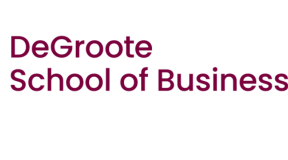The diploma program includes professional workshops, five term courses, and two quarter modules outlined as follows.
Professional Workshops
The orientation workshops are non-credit required classes focused on professionalism, ethics, leadership, communication and case analysis
A series of workshops on:
- Professionalism and Business Ethics
- Leadership and Communication
- Data Analytics
- Case Analysis
- Analytical Skills
These are designed to equip students with the essential enabling competencies required for success in professional accounting certification program. Students will receive a pass/fail on their transcript based on 100% attendance requirment.
Term Courses
For term courses students will complete a minimum of 36 hours of practice or experiential learning.
This course extends the knowledge base of earlier accounting courses and focuses on the integration of accounting issues through case studies. The main objectives of the course are: (1) to discuss and evaluate selected advanced accounting and financial reporting issues, emphasizing fundamental principles and concepts, as well as technical competency; (2) to develop case analysis and writing capabilities; and (3) to incorporate other areas of study such as International Financial Accounting Standards (IFRS) and Accounting Standards for Private Entities (ASPE), into the accounting context through comprehensive cases.
Term course (36 hours).
This course considers a number of advanced topics concerning both the auditor and the audit profession. It builds on the knowledge of the audit task derived in earlier courses as well as on the technical skills and breadth of knowledge obtained in earlier accounting courses. Since a central feature of accounting in today’s business world is the interaction of accounting professionals with computer-based information systems, topics related to the accountants’ role in the design and implementation of such system will also be discussed.
Term course (36 hours).
This course is designed to provide students with an advanced conceptual background and analytical tools necessary to evaluate financial statements issued by publicly held enterprises. It focuses on understanding the uses and limitations of both the financial statements and the traditional and non-traditional methods of analyzing them. We will discuss the financial statements, the accounting disclosure rules, the differential effects of alternative accounting principles, and the interpretation of financial information.
Term course (36 hours).
The objective of this course is to provide students with an in-depth understanding and analytical tools necessary for managing the finance of an entity. Topics include evaluating the entity’s financial state; examining the Treasury function; developing and evaluating capital budgeting processes and decisions; determining the value of a business, its tangible and intangible assets; managing financial risk; and evaluating the purchase and expansion or sale of a business.
Term course (36 hours).
An objective of this course is to examine an organization’s core competence and how successful organizations exploit their core competence to develop a strategic advantage, with a focus on developing the management accounting skills required in effectively implementing strategies. Another objective of this course is to provide students an understanding of the risk affiliated with an organization, the role of management accounting in mitigating such organizational risk, and developing the strategic management accounting skills required in incorporating risk management to implement strategies effectively.
Term course (36 hours).
Quarter Modules
For quarter modules students will complete a minimum of 18 hours of practice or experiential learning.
This course looks at best practices and takes a modern approach to reading and interpreting The Income Tax Act. Topics covered include an in-depth examination of the taxation of partnerships and trusts as well as the rules to prevent corporate surplus stripping and capital gains stripping.
Quarter module (18 hours).
The objective of this course is to build students’ critical enabling competencies and further develop their technical competencies using complex and highly integrative cases. Students will apply their behavioural, analytical, problem-solving, and decision-making skills to complex situations. The course will also focus on the development of professionalism and ethical behaviour as a professional accountant.
Quarter module (18 hours).
Program Schedule
The 2025 term will begin on May 1 2025 and conclude on July 26 2025.
Dress Code: Business Casual
Classrooms: Courses and workshops take place in person at the DeGroote School of Business McMaster Hamilton Campus.
Courses – Cohort 1
| Class time | Tuesday | Wednesday | Thursday |
| First 6 weeks: 9:00 am – 12 noon |
DPA 702 | DPA 603 | DPA 701 |
| First 6 weeks: 1:00 pm – 4:00 pm |
DPA 704 | DPA 602 | DPA 601 |
| Last 6 weeks: 9:00 am – 12 noon |
DPA 702 | DPA 603 | DPA 701 |
| Last 6 weeks: 1:00 pm – 4:00 pm |
DPA 703 | DPA 602 | DPA 601 |
Workshops – Cohort 1
| Date | Time | Workshop |
| Thursday, May 1 | 8:45 am – 10:00 am | Welcome Orientation Breakfast |
| Thursday, May 1 | 10:00 am – 4:00 pm | DPA 600: Case Analysis |
| Friday, May 2 | 9:00 am – 2:30 pm | DPA 600: Business Data Analytics |
| Friday, May 9 | 9:00 am – 2:30 pm | DPA 600: Analytical Skills |
| Friday, May 23 | 9:00 am – 12:00 pm | DPA 600: Leadership and Communication |
| Friday, May 23 | 1:00 pm – 4:00 pm | DPA 600: Professionalism and Ethics |
Courses – Cohort 2
| Class time | Tuesday | Wednesday | Thursday |
| First 6 weeks: 9:00 am – 12 noon |
DPA 704 | DPA 602 | DPA 601 |
| First 6 weeks: 1:00 pm – 4:00 pm |
DPA 702 | DPA 603 | DPA 701 |
| Last 6 weeks: 9:00 am – 12 noon |
DPA 703 | DPA 602 | DPA 601 |
| Last 6 weeks: 1:00 pm – 4:00 pm |
DPA 702 | DPA 603 | DPA 701 |
Workshops – Cohort 2
| Date | Time | Workshop |
| Thursday, May 1 | 8:45 am – 10:00 am | Welcome Orientation Breakfast |
| Thursday, May 1 | 10:00 am – 4:00 pm | DPA 600: Business Data Analytics |
| Friday, May 2 | 9:00 am – 2:30 pm | DPA 600: Case Analysis |
| Friday, May 16 | 9:00 am – 2:30 pm | DPA 600: Analytical Skills |
| Friday, July 4 | 9:00 am – 12:00 pm | DPA 600: Leadership and Communication |
| Friday, July 4 | 1:00 pm – 4:00 pm | DPA 600: Professionalism and Ethics |


